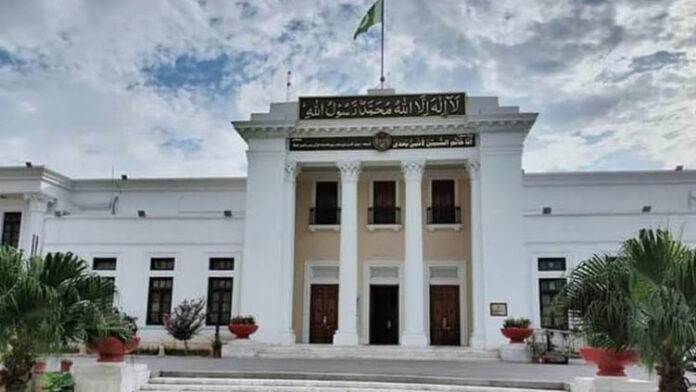- Advertisement -
PESHAWAR, Jan 13 (APP):A contentious debate unfolded in the provincial assembly on Monday regarding the proposed amendments under the Khyber Pakhtunkhwa Laws (Amendment) Bill 2025, which seeks to allow special assistants and advisers to head committees and commissions within the province.
The heated exchanges between government and opposition members prompted the Speaker to form a special committee to address the concerns.
During the session, Law Minister Aftab Alam tabled a motion to reconsider the bill after it was returned with objections from the Governor of Khyber Pakhtunkhwa.
This led to intense opposition from the Pakistan People’s Party (PPP) parliamentary leader, Ahmed Karim Kundi, who argued for adequate deliberation on legislative matters.
He criticized the government for overriding opposition-proposed amendments and asserted that the bill undermines democratic principles by granting non-elected individuals chairmanship of official committees.
“Special assistants and advisers are not public representatives,” Kundi remarked, warning that this move could challenge the supremacy of the Assembly and might lead to legal battles.
Similarly, MPA Adnan Khan expressed discontent over the dismissal of his proposed amendments, describing the bill as a strategy to accommodate a specific individual.
“The Assembly must not act as a rubber stamp for the government’s decisions,” he said, adding that the inclusion of non-elected officials in boards and councils erodes accountability and makes a mockery of the Assembly.
In response, Law Minister Aftab Alam justified the amendments, stating that the growing number of provincial departments—34 in total had necessitated the involvement of special assistants and advisers to manage governance effectively.
He explained that the Constitution’s Article 130 restricts the Chief Minister from appointing more than 16 cabinet members, making the inclusion of advisers essential for administrative efficiency.
Despite the explanation, government and opposition lawmakers continued to raise objections.
JUI-F’s Maulana Lutfur Rehman suggested that instead of empowering advisers, the government should strengthen its ministers under the 18th Amendment.
He further urged that such bills should be shared with all members and sent to committees for detailed scrutiny before being tabled.
Highlighting the constitutional dilemma, PPP’s Ahmed Kundi reiterated that the Assembly’s mandate was limited to holding ministers accountable, not advisers or special assistants. Advisers could neither vote on bills, nor they could be subjected to the same accountability mechanisms as elected representatives, he argued, demanding that the bill be sent to a select committee for a thorough review.
Adding to the criticism, government MPA Mushtaq Ghani vowed not to attend meetings chaired by non-elected officials.
“Giving leadership of committees to special assistants undermines the role of elected representatives and violates democratic norms,” he declared.
Ultimately, the Speaker announced the formation of a select committee under the chairmanship of Law Minister Aftab Alam to address the objections and refine the bill.
Meanwhile, the assembly debated the controversial nomination of non-experts, including local chairmen and political workers, to university syndicates and senates.
MPA Anwar Khan condemned the appointments, particularly in Benazir University, Upper Dir, where non-academics were made members of syndicate and senate bodies.
Minister for Higher Education Meena Khan Afridi acknowledged the issue, calling such appointments a violation of academic integrity.
He pledged to replace politically motivated nominations with qualified professionals.
However, PPP Leader Ahmed Karim Kundi argued that political workers should not be discredited outright, provided they possess the necessary skills.
Later the house paid tribute to victims of Balochistan coal mine accident.
During the session, prayers were offered for ten residents of Shangla who died in a coal mine accident.
Raising the issue, MPA Abdul Munim highlighted the recurring fatalities in coal mines and attributed them to illegal mining practices.
He urged the Balochistan government to provide compensation to the victims’ families and take steps to prevent such incidents

